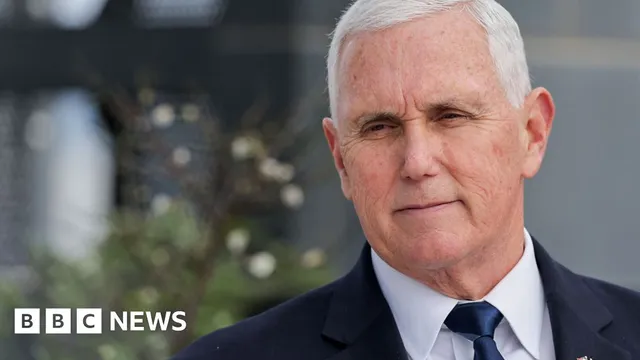
Mike Pence honored for defying Trump's election claims
2025-05-05 10:31- Mike Pence was honored with the Profile in Courage Award for his actions during the January 6 riot.
- The award acknowledges his refusal to go along with attempts to overturn the 2020 election results.
- Pence's actions exemplify political courage and are seen as vital for maintaining constitutional democracy.
Express your sentiment!
Insights
On January 6, 2021, during the U.S. Capitol riot, Mike Pence, then Vice President, faced pressure from President Donald Trump to overturn the 2020 election results. Instead of complying, Pence prioritized his constitutional duty, overseeing the certification of Joe Biden's victory while rioters stormed the Capitol. Afterward, he was criticized by Trump and supporters, who even chanted for his hanging, highlighting the perilous situation he was in. As a result of his actions, Pence recently received the John F. Kennedy Profile in Courage Award, recognizing his commitment to governance despite potential consequences. This award, established in 1989, honors those who exhibit political bravery, and previous recipients include notable figures like Barack Obama and Gerald Ford.
Contexts
The impact of the January 6 Capitol riot on American politics has been profound and multifaceted, affecting political discourse, party dynamics, and public perception of democracy. The riot, initiated by supporters of then-President Donald Trump, was a direct attempt to overturn the 2020 presidential election results. Its immediate aftermath led to widespread condemnation across the political spectrum, with many viewing it as an attack on the democratic process itself. The event prompted discussions about the resilience of American institutions and the potential vulnerabilities facing democracy, shaping public attitudes towards governance and political engagement. The images of violence and chaos during the riot significantly altered the narrative surrounding political protests and civil disobedience, causing a reevaluation of what constitutes acceptable political behavior in the United States. In the wake of the January 6 events, political polarization intensified, deepening divides within the Republican Party as well as between the parties. While some Republicans distanced themselves from Trump and the riot, others maintained their support, creating a split that has implications for party unity and electoral strategies. This divergence has led to primary challenges against established incumbents deemed insufficiently loyal to Trump, affecting candidate selection and electoral outcomes. The riot also catalyzed a backlash against populist movements and political extremism, galvanizing efforts among Democrats and some moderates to push for more stringent measures addressing disinformation and its implications for public trust in electoral processes. Thus, the incident has not only contributed to ongoing tensions within and across political parties but has also prompted potential electoral recalibrations in future elections. Moreover, the response of political leaders and elected officials has been crucial in shaping public sentiment post-riot. Legislative actions, including the second impeachment of Trump and subsequent investigations into the events of January 6, have sparked debates over accountability and free speech. The US Capitol riot served as a catalyst for discussions surrounding security measures, both physical and digital, as lawmakers sought to prevent similar occurrences in the future. As a result, there has been increased scrutiny of social media platforms regarding their role in inciting violence and spreading misinformation, raising questions about the balance between protecting free speech and ensuring public safety. A growing number of citizens have expressed concern about the influence of extremism in political dialogues, calling for a reevaluation of media and online conduct. Despite the chaos of January 6, there remains a larger narrative framing the event as a turning point for engagement in civic life. For some, the riot has mobilized grassroots movements advocating for reforms in political campaigning, voter rights, and civic education. The heightened awareness regarding the fragility of democracy has inspired many citizens to become more active participants in their communities, leading to increased voter turnout in subsequent elections and local initiatives aimed at fostering dialogue and inclusivity. Ultimately, the January 6 Capitol riot has not only reshaped immediate political dynamics but also left an indelible mark on American political culture, with long-lasting implications for how citizens engage with their government and with each other in the pursuit of a functioning democracy.